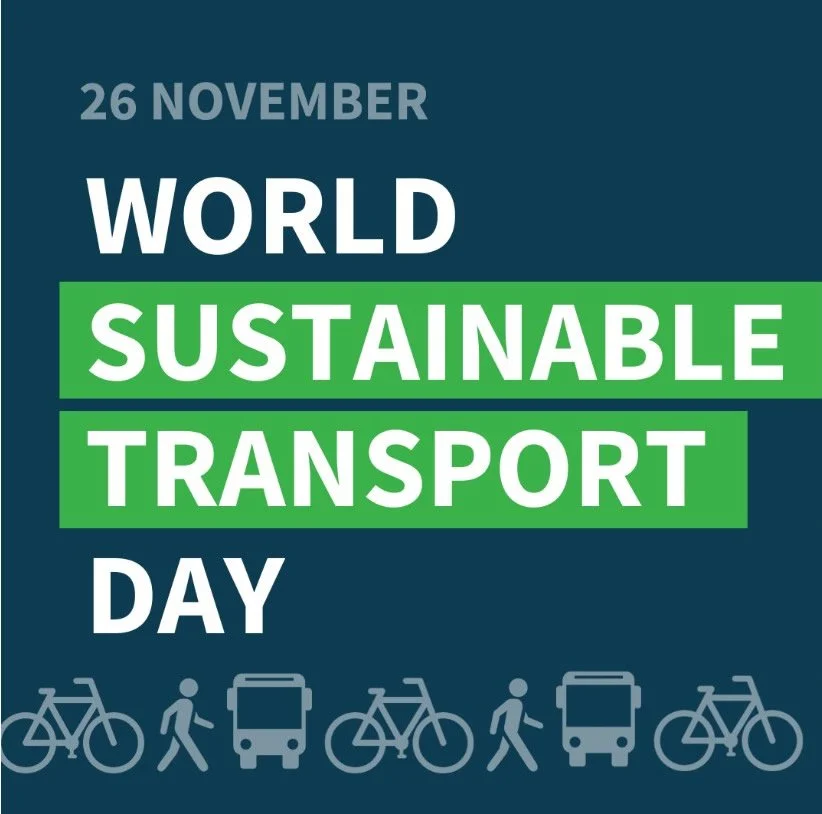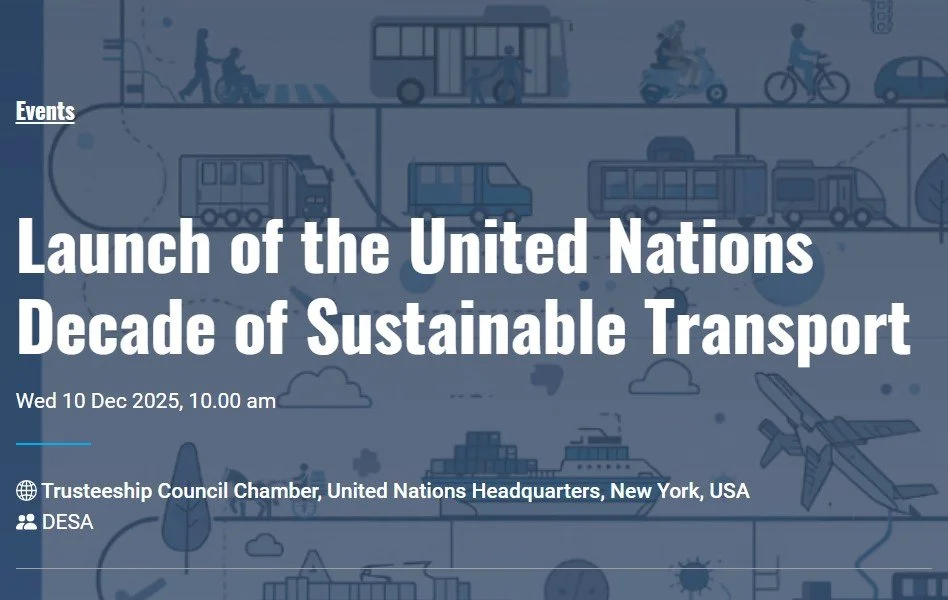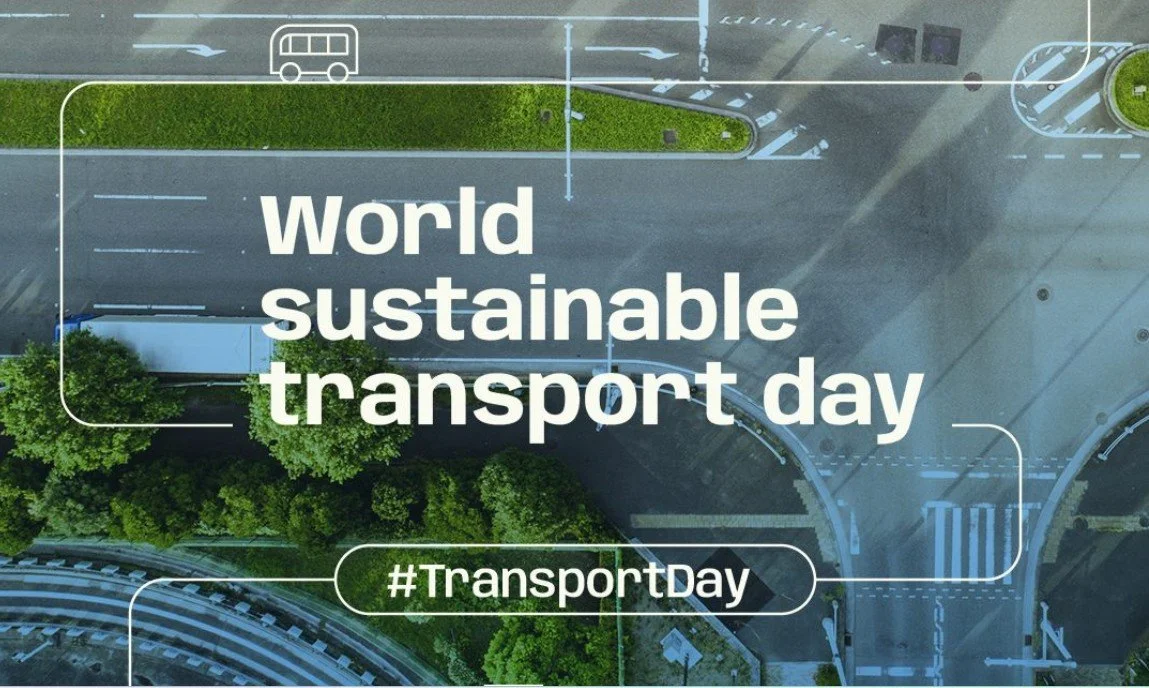PURPOSE: Recognizing the important role of safe, affordable, accessible and sustainable transport systems for all in supporting sustainable economic growth, improving the social welfare of people and enhancing international cooperation and trade among countries, the General Assembly decided, in its resolution A/RES/77/286 of May 2023 to declare November 26st as World Sustainable Transport Day. Through the resolution, the General Assembly invited all Member States, organizations of the United Nations system, international and regional organizations and civil society to mark the World Sustainable Transport Day by means of education and the holding of events aimed at enhancing the knowledge of the public on sustainable transport issues. In particular, the General Assembly called for focus on enhancing intermodal transport connectivity, promoting environmentally friendly transportation, and developing socially inclusive transport infrastructure. Transport lies at the heart of sustainable development. The sector accounts for about one-quarter of global energy-related carbon dioxide emissions and is at a crossroads. It is a challenging sector to set on a sustainable, low-carbon pathway. At the same time, the world recognizes the important role of transport in supporting economic growth, facilitating global supply chains, enhancing international cooperation and trade, in connecting people and communities to jobs, schools and health care and in the delivery of goods and services to rural and urban communities, thus providing all with equal opportunities and leaving no one behind.
FORUM: "Moving towards the new UN Decade of Sustainable Transport.'' World Sustainable Transport Day 2025. Sustainable transport connects communities, ensuring access to education, healthcare and economic opportunities. It underpins resilient economies by creating jobs, supporting livelihoods, reducing poverty and strengthening overall community resilience. Following the COP30 climate conference in Brazil, this year’s World Sustainable Transport Day focuses the road transport sector towards the new UN Decade of Sustainable Transport (2026–2035). The Decade, beginning on 1 January 2026, has six strategic pillars: equitable access; decarbonisation and access; logistics efficiency; people-centred urban mobility; safe and clean transport; and science, technology and innovation. As we mark the third World Sustainable Transport Day, we’ve already seen good progress on sustainability awareness. The upcoming UN Decade of Sustainable Transport will build on this momentum. A successful UN Decade will be measured by results on the ground. It's time to support governments and the road transport industry to drive real change. Let’s seize the opportunity and make mobility and logistics even safer, more efficient and greener for all. Follow the conversations with the hashtags: #26november, #sustainableTransportDay, #resilientTransport, #inclusiveTransport, #safetransport.
EVENTS: Third Observance of the World Sustainable Transport Day.
On November 26th, 2025 from 9:30 – 10:45 (EST) to mark theWorld Sustainable Transport Day 2025, a multi-stakeholder virtual webinar will be held to ensure meaningful and substantive engagement of stakeholders in the preparations for the UN Decade of SustainableTransport(2026-2035), The webinar shared updated information about theUN Decade of Sustainable Transportand its associated Implementation Plan. Register to participate!
On December 10th, 2025, UNHQ New York. We will Launch of Decade of Sustainable Transport. In 2023, the United Nations General Assembly declared the first ever United Nations Decade of Sustainable Transport to start in 2026. The launch of the UN Decade of Sustainable Transport will consist of an opening, a high-level segment, showcase of voluntary commitments, and an interactive multi-stakeholder roundtable. It will launch the Implementation Plan, which was developed by the United Nations Department of Economic and Social Affairs (UN DESA) in collaboration with the Regional Commissions and in consultation with Member States, the UN system and all other relevant stakeholders. The meeting will be open to all those in possession of valid UN Grounds Passes for the UNHQ in New York, up to the capacity of the Conference room. Representatives without a valid UN Grounds Pass could register to request Special Event Ticket through here before 2 December 2025.
On December 10th, 2025; The Organización Latinoamericana y Caribeña de Energía webinar entitled “Advances in Sustainable Mobility in Latin America and the Caribbean (LAC)” is aimed at the entire energy community, academia, institutions specialized in sustainable mobility. Watch the livestream!
On October 29th, 2025; from New Zealand; a webinar entitled “Maximising the potential of more sustainable journeys” was held and discussed sustainable journeys, including reducing fleet emissions, and alternative vehicle and transport options. Watch the livestream!
WORKSHOPS & SEMINARS
Global | Geneva - New dangerous goods transport rules: what you need to know.
Global | Vienna - Intermodality fuels IRU Green Compact Roundtable exchange at LKW Walter.
Estonia | Tallinn - e-CMR: The road to wider adoption.
Global | Geneva - Ours and theirs: DP World takes on carbon.
Global | Geneva - Options on the table: Financing commercial electric vehicles.
Global | Geneva - Efficient decarbonisation needs pragmatic, mode-sensitive reporting tools.
PUBLICATIONS: To receive periodic updates about the UN Decade of Sustainable Transport, please sign up for the information mailing list here. Find out more about sustainable transport and sustainable development and the Guidance on safe environments and mobility.
STATEMENTS: Read the Statement of the United Nations Secretary-General on the World Sustainable Transport Day 2024 and the Message of the UN Regional Commissions on World Sustainable Transport Day 2024.
PODCASTS: From electric and solar-powered vehicles, to renewable aviation fuel sources, to massive investments in green public transportation systems, to measures like carbon pricing and subsidies for low-carbon fuels, we can steer our societies towards a cleaner and more sustainable path for people and planet. Listen to the audio podcasts!
CAMPAIGN: There is no time to waste. Let’s get moving. This first World Sustainable Transport Day reminds us that the road to a better future depends on cleaner and greener transportation systems. Get the communication materials!
WHY WE CELEBRATE THE DAY?
The United Nations General Assembly designated November 26th as World Sustainable Transport Day. Transport is estimated to contribute every fourth ton of greenhouse gas (GHG) emissions globally and is one of the top emitting sectors in all regions, with a tendency to grow further on the back of economic growth and development. Fossil-fuel based road transport remains the dominant mode of transport in all regions, due to lack of viable alternatives. Road safety remains a major challenge in all regions. Globally, road crashes cause 1.3 million preventable deaths and 50 million injuries each year, 93% of which occur in low- and middle-income countries. Underdeveloped infrastructure, especially in rail, inland waterways and intermodal terminals/dry ports, hinders opportunities for modal shift. Investments in infrastructure and in physical and operational measures to increase the efficiency and effectiveness of transport systems, especially in freight, remain insufficient.
During the day, we hightlight the importance of cooperation in enhancing transport connectivity through an integrated intermodal transport system by developing quality, reliable, sustainable and resilient infrastructure, exchanging best practices to optimize the development of interconnected highways, roads, streets, railways, waterways, airways, areas of modal transfer and ports, by encouraging transport infrastructure construction and operations to minimize consumption of energy, land and other resources; To generate lower emissions of greenhouse gases, ozone-depleting substances and other pollutants and to ensure a positive social impact.
HOW TO GET INVOLVED!.
- Developing low carbon pathways for transport is critical to set the sector back on track to deliver on the 2030 Agenda and the commitments of the Paris Agreement.
- Strong alignment with the energy sector is essential to promote low-carbon transport ecosystems, including through the transition to electric mobility and the development of low emission fuels.
- Improving road safety calls for long-term commitment and action by governments. The Decade of Action for Road Safety 2021-2030 has set an ambitious target of preventing at least 50% of road traffic deaths and injuries by 2030 and provides the framework for the United Nations and its partners’ efforts to support countries’ in their road safety efforts, following the Safe System Approach.
- Digitalization, innovation and technology are key enablers for fostering connectivity, lowering transaction costs and making transport systems more efficient and reliable.
- Integration of mobility planning with urban planning, while taking due account of the principles of just transition, gender equality and social inclusion, is a key lever for increasing efficiency and environmental performance of urban transport systems.
- Achieving an environmentally sustainable modal share for rail and inland waterways requires prioritization of investments in transport infrastructure.
- Transport and logistics connectivity can unlock economic, social and environmental opportunities for least developed countries (LDCs), landlocked developing countries (LLDCs) and small island developing states (SIDS).
PARTNERSHIPS
The World Sustainable Transport Day is organized in partnerships with the United Nations Department of Economic and Social Affairs (UNDESA), the United Nations Road Safety Fund Secretariat, the United Nations Industrial Organization (UNIDO), the United Nations Development Programme (UNDP), the International Telecommunication Union (ITU), the International Civil Aviation Organization (ICAO), the International Maritime Organization (IMO), he World Meteorological Organization (WMO), the United Nations Framework convention on Climate Change (UNFCCC). In collaboration with the United Nations Economic Commission for Africa (UNECA), the United Nations Commission for Europe (UNECE), the United Nations Economic Commission for Asia and Pacific (U,NESCAP); United Nations Economic Commission of Latin America and the Caribbean (UNECLAC), United Nations Economic Commision for Western Asia (UNESCWA). With the participation of the UNSG Special Envoy on Road Safety, the International Transport Forum (ITF), the International Organization of Motor Vehicle Manufacturers (OICA), the International Road Federation (IRF), the Safety and Mobility, WHO; the International Road Transport Union (IRU), the International Union of Railways (UIC), the International Association of Public Transport (UITP), the European Cyclists’ Federation (ECF), the Transport, Health and Environment Pan-European Programme (THE PEP), the UNECE Working Party on Intermodal Transport and Logistics (WP.24), the China Air Transport Association, the China Road Transport Association (CRTA), the Road transport in Russia, the Australian Public Transport Industrial Association (APTIA), the Australian Transport Officers' Federation (ATOF), the NATROAD Australia, the International Federation of transport workers (IFTW).



